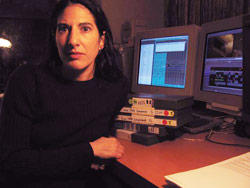
Producer Rachel Dretzin Dretzin produced "A Hidden Life" with Muriel Soenens and directed it with her husband, Barak Goodman, who was also the writer. Their previous reports for FRONTLINE include,"The Persuaders" (2004), "Failure to Protect" (2003), "Merchants of Cool" (2001) and "The Lost Children of Rockdale County" (1999). When we started work on this documentary in the summer of 2005, we saw the Jim West scandal mainly as a portal into a broader story about being gay in the political and cultural middle of America. But during the year we spent reporting, it became clear that the West scandal deserved a film of its own. And so, as often happens when a year of work is condensed into an hour of television, a lot of that broader story didn't make it into the final program. Luckily, much of what we learned of that story has been made available for people to read -- and watch -- on this Web site, and I also want to talk a bit about it here. · · · Spokane is a predominantly white city which for decades remained pretty isolated, culturally and geographically. When we made our first trip in August 2005, we expected to find a community largely hostile to gay rights efforts. Instead, what we found was a widely divergent, almost schizophrenic landscape. People we met on the street seemed very anxious to not be perceived as homophobic, insisting that their opposition to Jim West had nothing to do with his sexuality and was about other issues: abuse of office, for example. At the same time, one soon noticed that Spokane has virtually no openly gay city leaders, and the few prominent gay business people we met keep their sexuality quiet. We began to pick up clues that Spokane, like much of America, was in the throes of a major transition -- and most people were still very confused about how to feel about that. “Spokane, like much of America, was in the throes of a major transition -- and most people were still very confused about how to feel about that.” Until recently, Spokane, with its depressed economy and deserted downtown, has been viewed as a backwater, a place to escape from. But in the last decade, young people have begun to flock there, looking for a cheaper, less crowded alternative to cities like San Francisco and Seattle. And they've brought new attitudes with them. Until recently, Odyssey, the one gay youth center in town, kept its address unpublished and met behind an unmarked door. That changed during the period we were reporting our story. Now, not only can one find the address of Odyssey online, but the group works with the city's high schools and sponsors a Valentine's Day dance in a local high school gym for "gay, lesbian, bisexual, transgender and questioning" students. The public schools in Spokane have adopted a progressive attitude towards gay and bisexual students. Most of the kids we met seemed entirely comfortable with being out in high school. Matt Smith, a 16-year old senior at Rogers High School in Spokane, told us he thought he had gained more friends from coming out. Being gay, it seems, is a badge of "difference" in high school, and minority status is respected -- Smith was vice president of his high school class and an enthusiastic member of the ROTC. Matt Smith is on the edge of a social shift that's so recent that someone who graduated from Rogers just five or six years ago wouldn't recognize it. At Rogers, a high school student can be out -- even conservative and out -- and no one blinks an eye. Even Spokane's staid business community is feeling the winds of change. In 2003, the Downtown Spokane Partnership invited George Mason University public policy professor Richard Florida to advise them on revitalizing the city's ailing downtown. Florida told them Spokane needed to attract professionals with its "tolerance" -- meaning a more prominent gay population. The business community went to local gay leaders and asked them to try and think of ways to become more visible. The result: a proposal, still in the works, for a gay business district in Spokane. As gays and lesbians in Spokane gain confidence and visibility, an organized movement has sprung up to preserve Spokane's small-town family values. Penny Lancaster, a conservative activist, allowed us to film a meeting of her group, the Frontline Workgroup on Homosexuality. It was formed in reaction to initiatives such as a bill to extend benefits to the domestic partners of Spokane city workers and Washington's same sex-marriage amendment, which went before the Washington State Supreme Court during the time of the West scandal. Lancaster also invited us to a luncheon, hosted by the Spokane College Women's Association, at which the featured speaker Dr. John R. Diggs Jr. spoke about the public health risks of the homosexual lifestyle in terms that probably would have not been well-received on most college campuses. Lancaster summed up her feelings about her changing city in an interview: "It is a huge cultural shift. And it does feel like you're standing on a train track, and there is this big train coming at you. You see the lights, and you just want to hold up your hand and say, 'Don't do this, don't crash through our city.' And somehow you'd like to put a bubble around Spokane and let Spokane be a safe and healthy place to raise families, like it has been more or less in the past." home | introduction | watch online | the outing | spokane's view | interviews | producer's notebook posted nov. 14, 2006 FRONTLINE is a registered trademark of wgbh educational foundation. | SUPPORT PROVIDED BY
|






